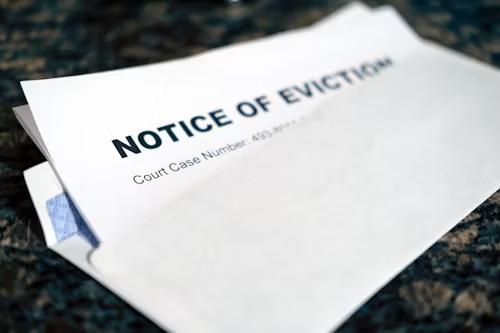If you’ve received an eviction notice, we can help you better understand your rights and aid you in stopping an eviction in California. We’re not attorneys or lawyers, but we offer expert eviction help in California by explaining to tenants what certain eviction notices and documents mean, and what their options are for fighting or stopping an eviction. If you’ve received one of the eviction notices below, we can help. Keep reading to learn how to stop eviction in California.

As a tenant, knowing your rights is critical. You may be protected from certain types of evictions, and you may be able to avoid eviction in California by fixing the issue identified in an eviction notice. The key is to act quickly—do not ignore notices or court papers, and seek legal help as soon as possible. Evictions can move fast, and you could lose a court case automatically if you take too long to act.
• You can only be evicted by a court order. It is illegal for a landlord to lock you out, shut off your utilities, or remove your things to force you out. Only a Sheriff, a Marshal, or their deputies may evict you, and only with a court order. Your landlord can only get a court order by starting an eviction case (also called an “unlawful detainer”).
• Your landlord must first give you a written eviction notice. Before your landlord can start an eviction case against you, they must give you a written notice stating why they want to evict you and how much time you have to do what they ask or move out. Your landlord cannot start an eviction case until the deadline in the notice has passed. The notice must be either (1) given to you in person; (2) given to another adult in your home and mailed to you; or (3) posted on your home and mailed to you. Just an email or text message, or verbal notice, is not enough.
• Read the notice carefully. Some notices give you an opportunity to pay money owed or to fix a problem. These are called “pay or quit” or “perform or quit” notices because they give you the option of fixing the problem or “quitting” (meaning, moving out) before a deadline. Other notices only give you a deadline to move out. If you don’t move out or fix the problem before the deadline, your landlord can start an eviction case, meaning they can ask a judge to order you to move out and possibly pay your landlord money. Here are some common types of notices:
3-Day Notice to Pay or Quit Pay rent or move out within 3 days 3-Day Notice to Perform
(or Cure) or Quit Fix a problem or move out within 3 days
3-Day Notice to Quit Move out within 3 days due to a serious lease violation that the landlord claims cannot be fixed
30-Day or 60-Day Notice to Quit Move out because your lease term has expired or for a valid “no fault” reason
• Try to fix the issue in the eviction notice before the deadline to delay eviction in California. If you do what the landlord says by the deadline, your landlord should not be able to get a court order evicting you. Get legal help if you have questions about a notice or if there’s something wrong with the notice. o If the notice asks you to pay rent or fix a problem within a certain number of days: Calculate the deadline by counting the number of business days. Start from the day after the notice was given to you and skip any Saturdays, Sundays, or court holidays. 1 For example, if a 3-day Notice to Pay is delivered on the Friday before a non-holiday weekend, the deadline is the following Wednesday. If you can pay the amount or fix the issue, be sure to tell your landlord in writing (a letter, email, or text message) when you have done so. Keep copies of that writing and of proof that you paid or fixed the issue, such as photographs and receipts. o If the notice tells you that you must move out within a certain number of days: Count every day starting with the day after the notice was given to you. Do not skip any days. If the last day that you count (e.g., the 3rd or 30th day) is a Saturday, Sunday, or a court holiday, 2 then the deadline is the next business day.

info@evictiondefenseca.org
818 307-1308
Monday-Friday: 9.00am to 5.00pm